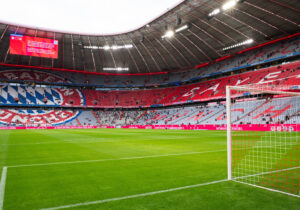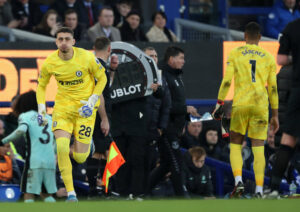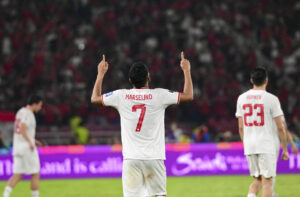To adapt Oscar Wilde’s most famous quotation, to win one major international tournament – a World Cup or a continental title, like the European Championship – is a great achievement, but to win two in succession is extraordinary. Only a handful of international teams in the history of football (both men’s and women’s football) have ever done so, which makes them truly the greatest international sides ever. At Euro 2020, France had the chance to join that most exclusive of clubs, but they blew it.
Whoever ends up winning Euro 2020, the suspicion will remain that the best side at the tournament – the one whose best form was indeed better than anyone else’s – was France, the reigning World Champions. And yet after their remarkable but entirely deserved defeat to Switzerland in the round of 16, the second game on a “Marvellous Monday” that may just be the greatest day in the history of the European Championship, they are out.
France Miss Opportunity to Become World and European Champions
A Multi-Factorial Loss
There are many reasons why the French failed to add the Euros to their World Cup crown; in modern technology and business jargon, it was a multi-factorial loss. At a basic level, coach Didier Deschamps, who was aiming for his own unique ‘double double’ of captaining and managing his national side to both the World Cup and the European Championship, was unlucky with injuries, especially at left-back, where his first and second choice players – the two Lucases of Hernandez and Digne – were injured for the Swiss match.
However, Deschamps himself compounded those injury woes by completely rejigging the team rather than simply using a midfielder or central defender at left-back. He began the match, and persisted for the entire first half, with wing-backs rather than full-backs, using midfielder Adrien Rabiot as his left-sided wing-back. The result was that France almost completely malfunctioned as a team, and not just as a defence. They conceded the first goal to Haris Seferović and completely conceded the initiative to a supremely motivated Swiss side, who were seemingly hell-bent on winning their country’s first match at the knockout stage of a World Cup or Euros since 1938.
Deschamps ditched the wing-back system at half-time, with Rabiot playing as a more orthodox left-back in the second half, and France duly rallied. After Switzerland had missed a penalty and with it the chance to take a two-goal lead, they produced a genuinely imperial purple match that is unlikely to be matched by any other team at the tournament. Two goals in three minutes from Karim Benzema and then a wondrous, long-distance curling shot from Paul Pogba gave them a 3-1 lead and it seemed inevitable that they would win the game and advance to play Spain in the quarter-final.
The Impact of Extra Substitutes
However, the French players had clearly not watched Spain’s match with Croatia earlier in the day, or if they had watched it they did not learn the obvious lessons that it gave. Just as Croatia fought back from a two-goal deficit at the death to force their match against Spain into extra time (during which they eventually conceded two more goals to the Spaniards, to lose 5-3), so Switzerland levelled their game against France in astonishing fashion to take it to extra time.
The fact that two matches on the same day saw two teams retrieve two-goal deficits so late on was surely more than a coincidence. In fact, it suggests that the increased number of substitutes allowed at the Euros, which is a specific response by UEFA to the Covid-caused overloading of players over the last year that may not become a permanent feature of the game, means that games are no longer ‘dead’ in the way that they used to be when a team took a two-goal lead into the final stages of a match. Quite simply, the greater number of fresh legs allowed from the bench means that teams who are losing a match can keep going for longer than they might have been able to in the past.
Complacency – and the Benzema Factor
Nevertheless, there were other contributing factors to France’s defeat against Switzerland. One may simply be complacency. Having narrowly avoided going two goals down, after the Swiss missed their penalty early in the second half, before surging into a 3-1 lead, the World Champions may have made the fatal mistake of thinking that the game was over. Certainly, the way that Pogba dallied on the ball near the halfway line before being dispossessed for Switzerland’s third goal suggested that he thought he only had to see out time to secure victory.
However, the final and perhaps decisive factor in France’s loss may have been that Deschamps broke one of the oldest rules not just in football but in life itself, namely “If it ain’t broke, don’t fix it”. The last-minute addition of Benzema, after he had been out of the national side for nearly six years, to an attack that was already overloaded with goal-scoring and goal-making ability, in the form of Kylian Mbappe and Antoine Griezmann, may just have unbalanced it, and with it the rest of the team.
Benzema himself played well at the Euros, scoring four goals in total (two against Switzerland and two against Portugal). Nevertheless, his inclusion in the team as its new spearhead may just have put Griezmann’s nose out of joint and unsettled Mbappe. Famously, Mbappe had idolised Benzema when he was growing up and so it may have been that he deferred to him (even unconsciously) in a way that he would not even have conceived of doing with any other player. Certainly, Mbappe could not replicate his World Cup-winning form at the Euros, failing to score in any of France’s four games and then missing the fifth and decisive spot-kick in the penalty shootout against Switzerland.
The Consolation for France
There is one consolation for France amid their current misery and soul-searching. It is that they still have the chance of doing ‘an international double’, and one that is actually even more impressive than the double of the World Cup and European Championship. Because Euro 2020 was delayed for a year because of Covid, it is now little more than a year until the next World Cup, which of course will be held in Qatar in November 2022.
With the possible exception of Benzema, who Deschamps may well decide to demote to the bench anyway, this French team is still young enough and good enough to recover from the disappointment of their Euro defeat and win a second World Cup in succession. If they do that, matching the achievement of Italy (in 1934 and 1938) and Brazil (in 1958 and 1962), then the disappointment of Euro 2020 will soon be forgotten.
Main Photo






